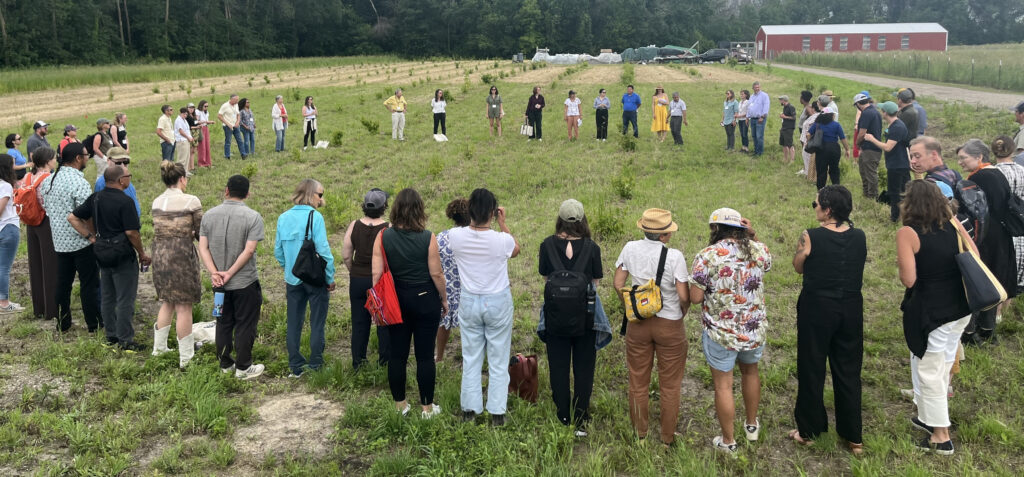
The evening of Election Day, I stepped outside in time to witness a sky full of birds returning to their nesting place for the evening. The sky was stunning, showing off the best of LA sunset colors, and filled with bird flight. That night, I paused with recognition that no matter who is elected president, the birds will keep gliding to and fro with the movements of the sun. Our relationship with land shows us the abundant ecosystems that nurture and sustain us, across time and space. As Daniel Hunter wrote in his excellent article in Waging Nonviolence, “On the days when I can’t sense any of these political possibilities…I zoom out further to the lifespans of trees and rocks, heading into spiritual reminders that nothing lasts forever.”
Many of us are still processing the election outcome across a full range of emotions. While much uncertainty remains, we know what is certain: our abundant community power, the love that grounds our commitment to communities, and our dreams for a future of food and agriculture that is more just, resilient, and democratic.
While we may not yet know all the implications of a second Trump administration for food and agriculture, prior experiences provide important clues. We know that to secure a more sustainable and just food system, we must stay committed, informed, and vigilant in our work. Some of the impacts we need to pay attention to include:
- Mass Deportation and Raids: President-elect Trump has campaigned on the promise of an unprecedented mass deportation operation of the approximately 11 million undocumented people living in the United States. Any actions taken in this direction would disproportionately impact food and farming industries, affecting urban and rural communities alike. The Center For American Progress reports that 1.7 million undocumented workers labor in some part of the U.S. food chain. Half of those workers are in the restaurant industry, while 85 percent of US agriculture workers are also foreign-born. As Claire Kelloway of Food & Power reports: “Donald Trump’s commitment to mass deportations of undocumented immigrants would upend farm communities.” Not only will businesses, local tax bases, and the food supply be dramatically impacted by these policies, but many already vulnerable and food insecure families could be terrorized through forced separation.
- Climate Change, Conservation, and Environmental Protection: Oil and coal lobbyists serving as Trump’s advisors on climate, energy, and environmental policy have already prepared executive orders that will roll back regulation of pollution regulations, withdraw the United States from the Paris Agreement, and derail investments in climate adaptation and resilience. Republicans are also likely to rescind climate guardrails on Inflation Reduction Act funding. Previously, Trump’s administration approved more than 100 toxic pesticides that are so dangerous that many are banned in other countries.
- Corporate Consolidation and Tariffs: Trump has repeatedly praised “tariff” as “the most beautiful word in the dictionary,” and suggested he will impose a 10 percent tariff on all imports and as high as 60 percent on imports from China. Such protectionist policies and their potential to spur retaliatory tariffs pose serious threats to our food and trade systems and relations with international partners.
- Hunger and Nutrition:Trump’s economic policies, acknowledged even by advisors like Elon Musk, are expected to be inflationary and will lead to at minimum “temporary hardship.” The organizations you support on the frontlines of feeding people will likely see an uptick in food insecurity, alongside the possibility of accessibility barriers and slashed funding for the Supplemental Nutrition Assistance Program. Additionally, the previous Trump administration reversed efforts to make school lunches healthier, and Project 2025 calls for the repeal of federal dietary guidelines altogether, as well as the federal food labeling mandate. The nomination of Robert F. Kennedy Jr., who supports more radical changes in food, agriculture, and nutrition policy, to lead the Department of Health and Human Services, adds uncertainty to the future. These shifts raise concerns for many about a departure from science-based policy on food safety, nutrition, and public health, particularly for vulnerable communities.

What happens next?
For SAFSF, the work for a resilient, just, and democratic food and agriculture system does not slow down. We commit to maintaining momentum, defending progress, and doubling down efforts in support of our communities and our planet. We offer the following guidance for funders:
- Take A Deep Breath: Isolation, exhaustion, and disorientation are tools of authoritarian regimes (just ask historian Timothy Synder.) Yes, the news will be dizzying in the months to come. Take care of yourself and those around you. Stay grounded and connected to community. The contemporary theologian Cole Arthur Riley offers, “Rest can feel like a risk when the world is aching. But exhaustion and disembodiment will not save us.”
- Keep Your Ears To The Ground: The best way to understand what your grantees and community partners need is by listening to them. Frontline community organizations and movement organizations are your best advisors on rapidly changing conditions and the needs of communities.
- Offer Security And Flexibility: Your community partners will be facing rapidly changing conditions. Free up their time by revising your grant application and reporting processes, and make multi-year commitments to give them the flexibility to be responsive and plan ahead. Recognize that your community partners on the frontlines of meeting basic needs, protecting vulnerable workers and families, and producing food in volatile market conditions will need as much runway to make it through uncertainty, let alone advocate for their rights.
- Play Offense and Defense: Protect the progress that has been made, especially regarding climate guardrails and labor protections. Explore how your own grant making or investments, and your organization’s voice and relationships can help reinforce these protections (see this Solidarity Is toolkit for resources). Deepen your engagement at local and state levels. Don’t hesitate to support both defensive and proactive litigation, advocacy, and lobbying – within legal limits. For guidance, join our webinar series with Alliance for Justice’s Bolder Advocacy Program. Remember that regranting organizations and intermediaries often have more flexibility in funding lobbying and advocacy than traditional foundations.
- Make New Friends: Transition always leads to disruption. The Detroit-based community organizer and urban farmer Grace Lee Boggs said “Every crisis, actual or impending, needs to be viewed as an opportunity to bring about profound changes in our society.” Let us not retreat to a mindset of scarcity/competition/complacency, but organize and embrace our abundant, intersectional community power. We must grow and diversify our allies and strengthen our partnerships. The good food movement must reach out beyond our own ecosystem to build powerful alliances in the immigrant rights, labor justice, environmental justice, and housing rights movements. We must invite new allies into our spaces and show up for others.
- Think Long Term: The historian Nancy Maclean, author of Democracy In Chains, spoke to the Health and Environmental Funders Network in Durham, North Carolina a few weeks ago about how this present political moment is the result of coordinated investment over the course of decades. It’s time for those of us who care about a climate-resilient, regenerative, just, and equitable food system to move beyond the grant cycle and envision the strategy for the next 10-20-50 years. Funders need to invest in movement building, which means offering ongoing support to allow movement leaders to be nimble and adaptable while building lasting infrastructure and pursuing long-game strategies.
- Consider Democracy: In general, we don’t talk much about democracy in food and agriculture outside of election years. But we should. Community food systems are powerful sites for community leadership, grassroots policy advocacy, and civic oversight. On the flip side, the consolidation of corporate power over our food supply not only limits our choices and harms the environment and public health, it also constrains the flow of information, undermines the agency of producers, and disenfranchises consumers. How can we fortify democratic participation in food and agriculture? As the Election Day to Every Day campaign implores, “Anti-democracy forces don’t defund their infrastructure after every election cycle, forcing groups to downsize and lose momentum. We shouldn’t either.”
I cannot emphasize how important it is to be engaged in this work together with us at this time. Now is the time to build consensus in the field about how food and agriculture funders will support communities through rapidly changing conditions. We hope you will stay engaged, and share what you are seeing and experiencing.
In Community,

Clare Fox, SAFSF Executive Director